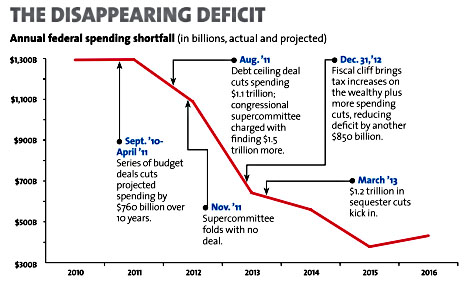The main thing you need to know about today’s budget agreement is that it’s very modest. It repeals a little bit of the sequester cuts, and pays for it with a few small cuts in entitlements and some even smaller increases in user fees. Overall, the numbers are tiny enough that it’s hard to see how anyone can get either too excited or too outraged over it.
Needless to say, this hasn’t stopped the usual suspects (Heritage, Club for Growth, various tea party groups) from acting as though it represents the end of Western civilization. But they’ve overplayed their hands this time, and GOP leaders in the House have apparently had enough of these clowns. Both John Boehner and Eric Cantor essentially told them to piss off, and I suspect that this agreement is going to get a lot of Republican votes. I’ll predict at least 150 Republican votes in the House,  maybe more. The tea party rump is truly going to be a rump this time.
maybe more. The tea party rump is truly going to be a rump this time.
That said, it was interesting reading the reaction of conservative wonk-star Yuval Levin to the deal:
This deal would amount to the Democrats accepting the implications of their misjudgment in abiding the Budget Control Act in 2011….It doesn’t much change the terms reached in the original Budget Control Act and sequester deal, and essentially cements the Democrats’ loss and miscalculation in that deal.
The Democrats’ hope, given that they control both the White House and the Senate, was to replace the sequester with some combination of tax increases and more palatable spending cuts….That the Democrats would accept a deal like this is a pretty striking indication of how the Republican House has changed the conversation on the spending front since 2010. Think of it this way: In their first budget after re-taking the majority—the FY 2012 Ryan budget, passed in 2011—the House Republicans wanted discretionary spending to be $1.039 trillion in 2014 and $1.047 trillion in 2015. These budgets were of course described by the Democrats and the political press (but I repeat myself) as some reversion to humanity’s barbaric past. Yet this proposed deal with the Democrats would put discretionary spending at $1.012 trillion in 2014 and $1.014 trillion in 2015—in both cases below that first House Republican budget.
To some extent, Levin is probably overstating his case in order to nudge conservatives on board a deal he thinks is palatable—and away from yet another round of government shutdowns, which he correctly views as disastrous for Republicans. Still, he’s basically right: Democrats originally believed the sequester would never happen. Either the supercommittee would replace it, or else Republicans would eventually cave in because they couldn’t tolerate the defense cuts. But that turned out not to be true. They aren’t happy with the defense cuts, but in the end, to the surprise of Democrats, they’ve decided they can live with them.
The ultimate result, as Levin says correctly, is a budget that’s below even the pipe-dream Ryan budget of 2011. I’d make a bit less of this than Levin, since Ryan’s budgets have always backloaded their cuts, but it’s still pretty remarkable. Two years ago, Ryan’s budget was basically at the outer limit of mainstream conservative wish lists. Today it looks tame.
Quibbles aside, Levin is right: Republicans have massively changed the spending conversation since 2010. Austerity has won.













